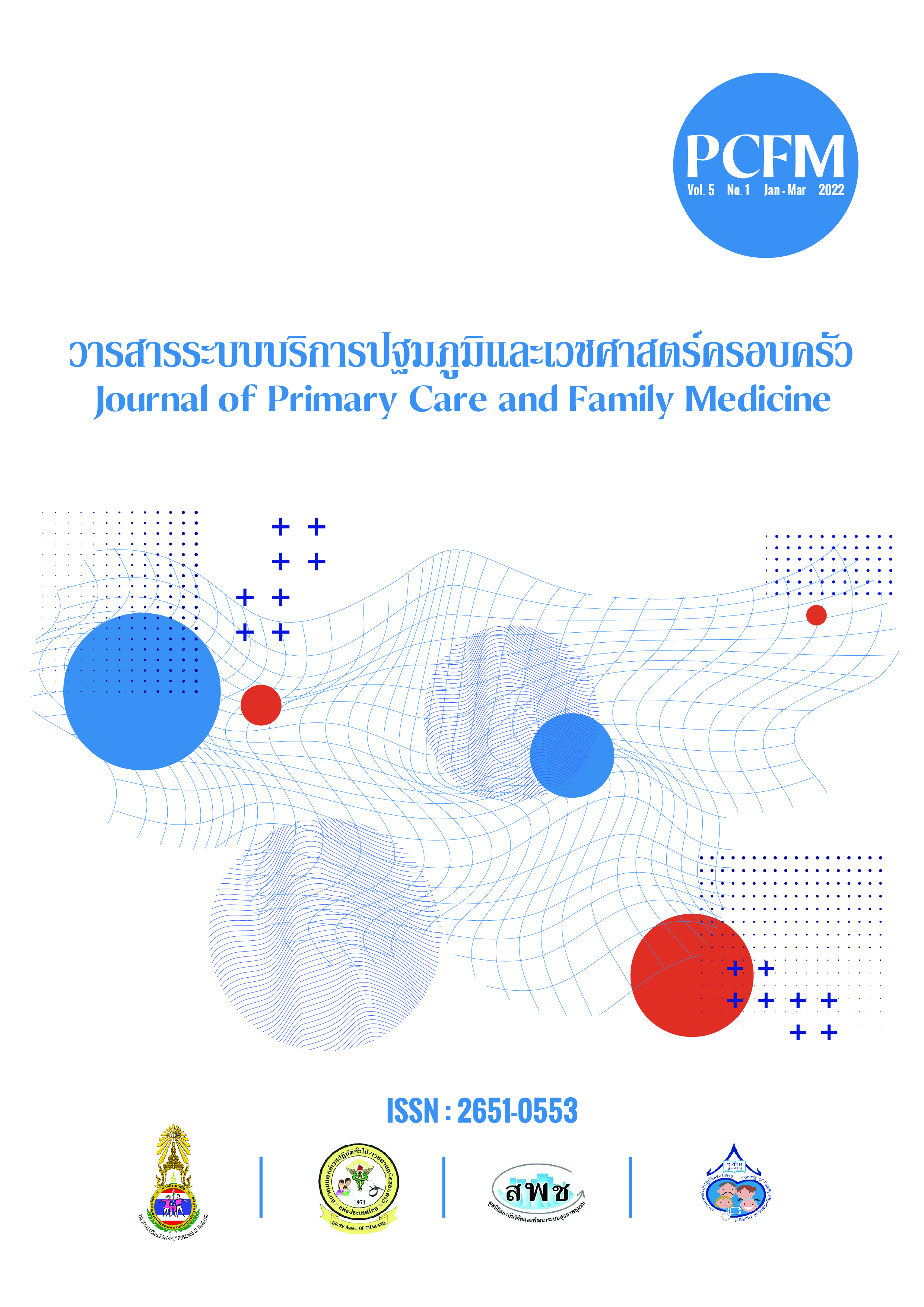ผลของมาตรการสร้างความรอบรู้ทางสุขภาพต่อผลลัพธ์ทางสุขภาพของผู้ป่วยเบาหวานชนิดที่ 2: การศึกษาในข้อมูลวัดซ้ำ ผลของมาตรการสร้างความรอบรู้ทางสุขภาพต่อผลลัพธ์เบาหวาน
Main Article Content
บทคัดย่อ
วัตถุประสงค์: เพื่อเปรียบเทียบผลลัพธ์ทางสุขภาพและต้นทุนค่ายาของผู้ป่วยเบาหวานก่อนและหลังการเข้ารับมาตรการสร้างความรอบรู้ทางสุขภาพ ที่สถานบริการปฐมภูมิหัวเวียง จังหวัดลำปาง
วิธีการศึกษา: การวิจัยแบบตามรุ่นย้อนหลังนี้ทำในผู้ป่วยเบาหวานชนิดที่ 2 ที่ไม่สามารถควบคุมระดับน้ำตาลในเลือดได้ ซึ่งได้เข้ารับมาตรการสร้างความรอบรู้ทางสุขภาพที่สถานบริการปฐมภูมิหัวเวียง ตั้งแต่เดือนกรกฎาคมถึงธันวาคม พ.ศ. 2563
ระดับฮีโมโกลบินเอวันซี (HbA1c) และระดับน้ำตาลในเลือดตอนเช้าหลังอดอาหารข้ามคืน (FBS) ของผู้ป่วย ถูกเปรียบเทียบกับค่าตั้งต้น นอกจากนี้ การศึกษานี้ได้เปรียบเทียบจำนวนชนิดและราคายาเบาหวานต่อวันของผู้ป่วยก่อนและหลังเข้าร่วมมาตรการ Pair sample t-test ถูกใช้ในการเปรียบเทียบปริมาณยาเบาหวานที่จ่ายและต้นทุนของยา การวิเคราะห์ถดถอยเชิงเส้นในข้อมูลวัดซ้ำถูกใช้เพื่อทดสอบผลของมาตรการสร้างความรอบรู้ทางสุขภาพต่อการควบคุมเบาหวาน
ผลการศึกษา: ผู้ป่วยเบาหวานทั้งหมดจำนวน 81 คนถูกรวมในการศึกษา โดย 57 คน (ร้อยละ 70.4) เป็นเพศหญิง อายุเฉลี่ยเท่ากับ 56.95 ปี ผลจากการวิเคราะห์ถดถอยชี้ให้เห็นว่า มาตรการสร้างความรอบรู้ทางสุขภาพสามารถลดทั้งระดับ FBS และ HbA1c ได้ 46.4 มิลลิกรัม ต่อดล. (P<0.001) และร้อยละ 0.3 (P=0.044) ตามลำดับ ยิ่งไปกว่านั้น ไม่มีความแตกต่างของจำนวนชนิดของยาเบาหวานที่จ่ายและราคายาต่อวัน เมื่อเปรียบเทียบก่อนและหลังเข้าร่วมมาตรการ
สรุป: การศึกษานี้แสดงให้เห็นว่ามาตรการสร้างความรอบรู้ทางสุขภาพสามารถทำให้ผลลัพธ์ของโรคเบาหวานดีขึ้น โดยไม่เพิ่มต้นทุนค่ายา งานวิจัยในภายภาคหน้า เพื่อสำรวจผลในระยะยาวของมาตรการสร้างความรอบรู้ทางสุขภาพในบริบทการให้บริการระดับปฐมภูมิอื่นๆ เป็นที่แนะนำ เพื่อให้เข้าใจการคงอยู่ของประสิทธิผลของมาตรการมากขึ้น
Article Details

อนุญาตภายใต้เงื่อนไข Creative Commons Attribution-NonCommercial-NoDerivatives 4.0 International License.
เนื้อหาและข้อมูลในบทความที่ลงตีพิมพ์ในวารสาร PCFM ถือเป็นข้อคิดเห็นและความรับผิดชอบของผู้เขียนบทความโดยตรง ซึ่งกองบรรณาธิการวารสารไม่จำเป็นต้องเห็นด้วยหรือร่วมรับผิดชอบใด ๆ
บทความ ข้อมูล เนื้อหา รูปภาพ ฯลฯ ที่ได้รับการตีพิมพ์ลงในวารสาร PCFM ถือเป็นลิขสิทธิ์ของวารสาร PCFM หากบุคคลหรือหน่วยงานใดต้องการนำทั้งหมดหรือส่วนหนึ่งส่วนใดไปเผยแพร่ต่อหรือเพื่อกระทำการใด ๆ จะต้องได้รับอนุญาตเป็นลายลักษณ์อักษรจากวารสาร PCFM ก่อนเท่านั้น
เอกสารอ้างอิง
Department of Disease Control ,Ministry of Public Health Thailand. International Diabetes Federation issue 2018 [Internet]. [cited 2021 Jul 5]. Available from: http://www.thaincd.com/2016/news/announcement-detail.php?id=13256&gid=16
Division of Non Communicable Diseases, Ministry of Public Health, Thailand. Indicators of uncontrolled diabetes mellitus and hypertension 2018 [Internet]. [cited 2021 Jun 19]. Available from: http://www.thaincd.com/2016/mission/documents-detail.php?id=12966&tid=32&gid=1-020
Rubin RR, Peyrot M. Quality of life and diabetes. Diabetes/Metabolism Research and Reviews. 1999;15(3):205–18.
Jönsson B. The economic impact of diabetes. Diabetes Care. 1998 Dec;21 Suppl 3:C7-10.
ABCDE-Health Literacy Scale of Thai Adults. Health Education Division, Department of Health Service Support, Ministry of Public Health, Thailand [Internet].[cited 7 May 2021]. Available from: http://hed.go.th/linkhed/file/597
Al Sayah F, Majumdar SR, Williams B, Robertson S, Johnson JA. Health literacy and health outcomes in diabetes: a systematic review. J Gen Intern Med. 2013 Mar;28(3):444–52.
Schillinger D, Grumbach K, Piette J, Wang F, Osmond D, Daher C, et al. Association of health literacy with diabetes outcomes. JAMA. 2002 Jul 24;288(4):475–82.
Ellis SE, Speroff T, Dittus RS, Brown A, Pichert JW, Elasy TA. Diabetes patient education: a meta-analysis and meta-regression. Patient Educ Couns. 2004 Jan;52(1):97–105.
Mazzuca SA, Moorman NH, Wheeler ML, Norton JA, Fineberg NS, Vinicor F, et al. The Diabetes Education Study: A Controlled Trial of the Effects of Diabetes Patient Education. Diabetes Care. 1986 Jan 1;9(1):1–10.
Rickheim PL, Weaver TW, Flader JL, Kendall DM. Assessment of group versus individual diabetes education: a randomized study. Diabetes Care. 2002 Feb;25(2):269–74.
Kim S, Love F, Quistberg DA, Shea JA. Association of health literacy with self-management behavior in patients with diabetes. Diabetes Care. 2004 Dec;27(12):2980–2.
Noppakraw J, Chintanawat R, Khampolsiri T. Health Literacy and Self-Management in Older Persons with Type 2 Diabetes Mellitus. Nursing Journal. 2020 May 14;47(2):251–61.
Sarin S, Moolsart S, Chailimpamontree W. The Effectiveness of a Health Literacy Development Program in Patients with Type 2 Diabetes Risking to Chronic Kidney Disease. Nursing Journal of The Ministry of Public Health. 2019 Aug 31;29(2):64–73.
Mantwill S, Schulz PJ. Low health literacy associated with higher medication costs in patients with type 2 diabetes mellitus: Evidence from matched survey and health insurance data. Patient Education and Counseling. 2015 Dec 1;98(12):1625–30.
Motivational interviewing in NCDs Department Of Mental Health , Ministry of Public Health Thailand [Internet].[cited 3 February 2021]. Available from: https://www.dmh.go.th/ebook/view.asp?id=389
Meephosom U.The effectiveness of individualized health education to control blood sugar for diabetic patients at Bangsai Hospital, Ayutthaya province. Nakornsrithammarat journal. 2019 Jan;1(2):13-22.
Chen SM, Creedy D, Lin H-S, Wollin J. Effects of motivational interviewing intervention on self-management, psychological and glycemic outcomes in type 2 diabetes: a randomized controlled trial. Int J Nurs Stud. 2012 Jun;49(6):637–44.
Detkong T. Effects of a motivational interviewing program to reduced systolic and blood glucose levels for type 2 Diabetes Mellitus patients. J Bamrasnaradura Infect Dis Ins. 2020 Sep;26(3):62-71.
Pokpirom P, Rookkapan K. Effect of Brief Motivational Interviewing with Education and Telephone Follow up by Pharmacists among Type 2 Diabetic Patients: A Randomized Controlled Trial. T JPP. 2020 Apr 27;12(4):984–96.
Ask Me 3: Good Questions for Your Good Health | IHI - Institute for Healthcare Improvement [Internet]. [cited 2021 Jul 5]. Available from: http://www.ihi.org:80/resources/Pages/Tools/Ask-Me-3-Good-Questions-for-Your-Good-Health.aspx
Kidney Disease Improving Global Outcomes. KDIGO 2012 clinical practice guideline for the evaluation and management of chronic kidney disease. 2013:19-62.
StataCorp. Stata Statistical Software: Release 13, College Station, TX: StataCorp LP. 2013.


